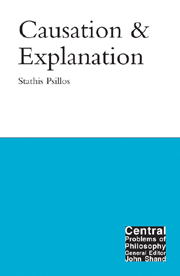8 - Deductive–nomological explanation
from III - Explanation
Summary
The empiricist legacy
The modern empiricist approach to the connection between causation and explanation was shaped by Hume's critique of the relation between cause and effect. As was already noted in the Introduction, the logical empiricists took Hume to have offered a reductive account of causation, and in particular one that frees talk about causation from any commitments to a necessary link between cause and effect. Within science, Carnap stressed, “causality means nothing but a functional dependency of a certain sort” (1928: 264). The functional dependency is between two states of a system, and it can be called a “causal law” if the two states are in temporal proximity, and one precedes the other in time. Schlick expressed this idea succinctly by pointing out that:
the difference between a mere temporal sequence and a causal sequence is the regularity, the uniformity of the latter. If C is regularly followed by E, then C is the cause of E; if E only ‘happens’ to follow C now and then, the sequence is called mere chance.
(1932: 239)Any further attempt to show that there was a necessary ”tie” between two causally connected events, or a “kind of glue” that holds them together, was taken to have been proved futile by Hume, who maintained that “it was impossible to discover any ‘impression’ of the causal nexus” (Schlick 1932: 246).
Information
- Type
- Chapter
- Information
- Causation and Explanation , pp. 215 - 240Publisher: Acumen PublishingPrint publication year: 2002
